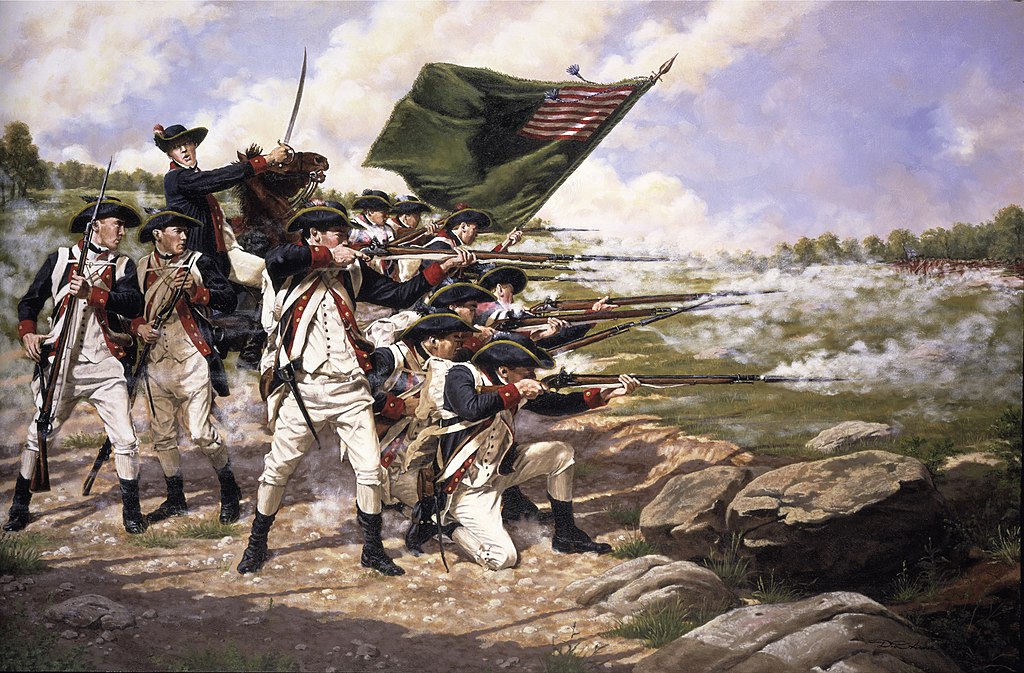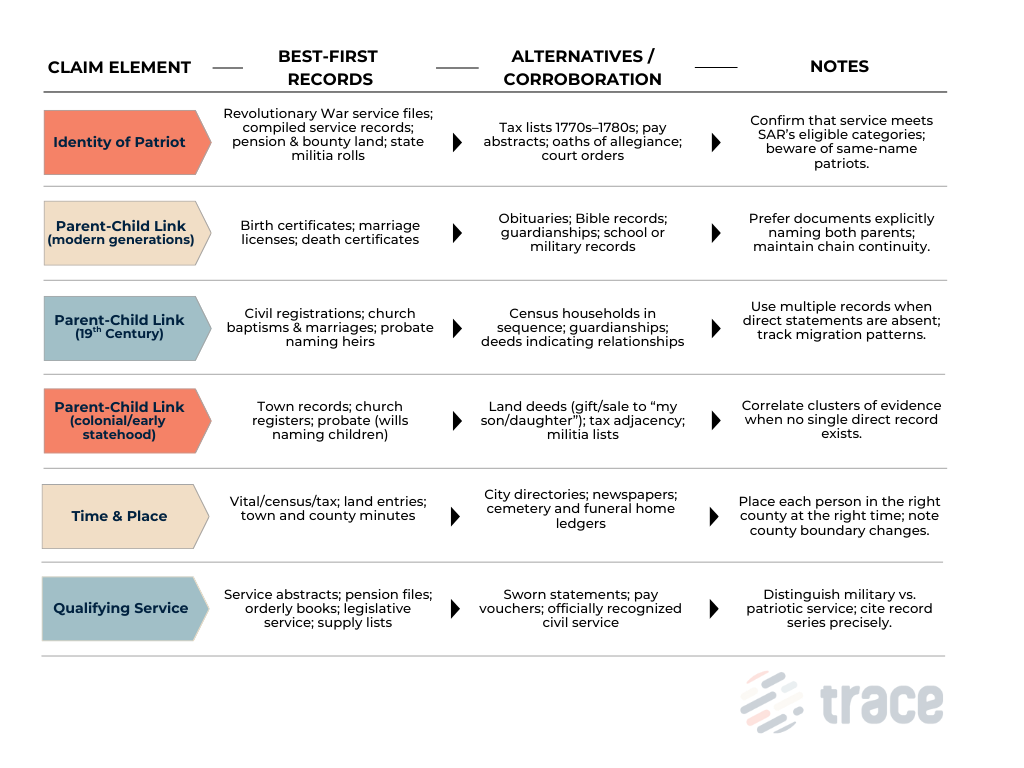If you believe you descend from a patriot who aided the cause of American independence, Trace can help research and verify each generational link and prepare an application that meets SAR standards.
Our professional genealogists compile your lineage documentation to the standard and format required by the society.

The Sons of the American Revolution (SAR) accepts applications from men who can establish a direct line of descent from an individual who provided qualifying service between 1775 and 1783. This service may be military service (e.g., Continental Army, state militia, naval duty) or patriotic service (e.g., furnishing supplies, serving in civil office, swearing allegiance). Each parent–child connection from the applicant back to the patriot must be supported by credible documentation.
Note: Standards and accepted sources may change. While Trace aligns research with the SAR’s published guidelines, final membership approval rests with the SAR.
The American Revolution unfolded across diverse regions—New England campaigns, the southern frontier, naval engagements, and western outposts. The conflict generated a wide variety of records: muster rolls, pay abstracts, pensions, bounty land files, county tax lists, and legislative proceedings. Civilian support, from supplying provisions to taking oaths of loyalty, was equally vital and can establish eligibility when properly documented.
This upheaval reshaped everyday record-keeping. Local governments recorded supply contributions, assemblies compensated soldiers’ families, and congregations noted prayers for independence. These scattered sources often form the puzzle pieces that authenticate lineage for SAR membership.
In addition, many patriots relocated after the war, seeking land in frontier states or newly opened territories. Migration patterns create challenges, as records may be scattered across multiple counties and states. Identifying the correct individual often requires cross-referencing land deeds, tax lists, and census entries that follow a family across decades.
Military service includes documented duty in the Continental Army or Navy, state militias, rangers, artillery units, or privateer ships. Supporting evidence may come from service abstracts, muster rolls, orderly books, pensions, and bounty-land claims.
Patriotic service involves activities such as furnishing supplies, serving in local or state office, swearing an oath of allegiance to the new republic, or performing civic duties that advanced the Revolutionary cause. Proof can appear in legislative journals, county court minutes, audited supply accounts, tax rolls, or oaths of allegiance.
The SAR makes the ultimate determination of qualifying service. Our role is to uncover and assemble comprehensive evidence.
_LCCN2005696231.jpg)
To qualify, the SAR expects records that establish:
Trace applies the Genealogical Proof Standard (GPS): thorough research, precise source citations, correlation of evidence, resolution of conflicts, and well-reasoned conclusions.

1) What makes me eligible for SAR membership?
Men who can document direct descent from a qualifying patriot (1775–1783) through military service or patriotic service may be eligible. Final decisions rest with the SAR.
2) Will my packet be formatted for SAR?
Yes. Our professional genealogists can prepare your submission to the SAR’s specifications with a numbered exhibit list and precise citations.
3) How do you handle two people with the same name?
We use chronology, geography, unit history, FAN analysis (friends/associates/neighbors), and spouse/children correlations to separate identities, then document the reasoning in the report.
4) What if my county lost records to fire or flood?
We seek to replace any lost or "missing" records with acceptable alternatives such as chancery files, tax lists, legislative petitions, church registers, land adjacency, and newspapers.
5) How long does this take?
It depends on repository access and case complexity. We provide milestone targets after the preliminary review and refine them as evidence dictates.
6) Do you coordinate with SAR chapters?
We prepare packets to society standards but we do not submit them for you. You are responsible for coordinating and submitting your application to a local SAR chapter.
7) What happens if a direct record of parentage doesn’t exist?
Our professional genealogists build an indirect case, called a proof argument, using multiple independent sources and explain the logic under the Genealogical Proof Standard.
9) Will you obtain certified copies?
When necessary and available, yes—we can request certified or official copies, or provide instructions for you to obtain them.
10) Do you guarantee acceptance?
No. The SAR makes the final decision on all membership applications. Our role is to research and provide a fully documented and sourced lineage for submission.
Trace follows the Genealogical Proof Standard and recognized best practices. We distinguish between original vs. derivative sources, primary vs. secondary information, and direct vs. indirect evidence. Conflicts are explicitly addressed, and negative searches recorded.
“Connecting my line to a Revolutionary patriot felt daunting. Trace uncovered parish baptisms, land deeds, and a militia roster entry that tied the lineage together. My SAR packet was accepted without revisions.” — Stephen W.
“A courthouse fire left us without vital records. Trace rebuilt the lineage with tax records, guardianships, and service records. Their thorough work gave me confidence in my SAR membership.” — Robert K.
“Our family lore included a patriot, but no documentation. Trace’s researchers tracked migrations across three states, tying census records to probate and land deeds, ultimately proving the connection and preparing my successful SAR application.” — Henry M.

Earlier generations often require church, probate, land, and tax sources to substitute for missing civil records.